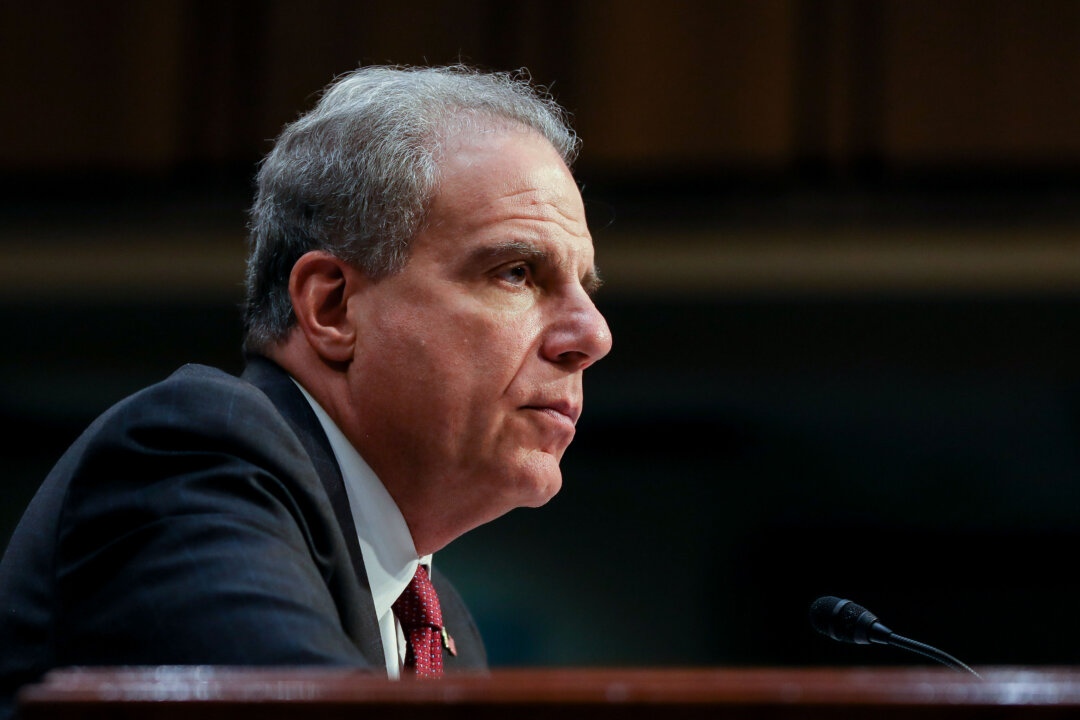Inspector General Michael Horowitz said he is currently reviewing a draft of the report and hopes it will be ready before Jan. 20, 2025.
A report detailing an investigation into the events that unfolded on Jan. 6, 2021, will likely not be ready before the November presidential election, the U.S. Department of Justice’s inspector general said on Sept. 25.
“I doubt it would be done in time for the election,” Inspector General Michael Horowitz told a congressional committee in Washington.
Horowitz announced on Jan. 15, 2021, that his office would be investigating the role of Department of Justice (DOJ) personnel in responding to the breach of the U.S. Capitol that took place the previous week as members of Congress prepared to certify electoral votes.
The inspector general said the investigation would examine what information was available to the DOJ and components such as the FBI before Jan. 6, whether the information was shared with law enforcement agencies, and whether any DOJ protocols, policies, or procedures “adversely affected the ability of DOJ or its components to prepare effectively for and respond to the events at the U.S. Capitol on January 6.”
Horowitz said at the time that his office would make sure its investigation did not interfere with criminal probes and prosecutions related to the breach.
During the committee hearing, Rep. Thomas Massie (R-Ky.) noted that the election is in several weeks, followed by the next electoral vote certification and inauguration. He asked Horowitz why the report is taking so long.
“We ended up pausing it pending the ongoing criminal cases,” Horowitz said.
The investigation was reinitiated in 2023, he said. The inspector general is currently in the process of reviewing a draft of the report.
The report has not been sent to the DOJ for classification procedures, or redactions.
Horowitz later said that he hopes the report will be ready before Jan. 20, 2025, the date of the next presidential inauguration.
FBI Informants
The FBI had confidential human sources (CHSs) in the crowd on Jan. 6, according to multiple former officials.
“My understanding now is there were CHSs on-site,” Steven D’Antuono, the assistant director in charge of the FBI’s Washington field office until he retired in November 2022, told members of Congress last year.
Attorneys for some of the Jan. 6 defendants have said that more than 50 informants working for the bureau and other agencies were among the crowd. Steven Sund, the former U.S. Capitol Police chief, has said there were both informants and undercover agents, although D’Antuono said that he’s not aware that the FBI had any agents there.
Massie asked Howoritz whether the forthcoming report would go over evidence on the number of confidential informants.
“Our report will include information in that regard,” Horowitz said.
He declined to provide more details, such as how many of the informants went into the Capitol, saying that the report is in draft form and that some of the details might be classified.
Horowitz said he did not recall whether any confidential sources were reimbursed by the FBI for travel to Washington on Jan. 6 and that, even if he remembered, he would not share the information during the hearing for the same reasons.
Horowitz did agree that confidential human informants should follow the government’s CHS protocols and said information on that would also be part of the report.
Massie wrote in a Sept. 25 post on social media platform X that the number of FBI informants participating in Jan. 6 “will shock folks.”
DHS Inspector General Report
The U.S. Department of Homeland Security’s inspector general found in a report released on July 31 that the Secret Service, because of communication issues, only narrowly kept then-Vice President Mike Pence away from protesters and rioters.
Inspector General Joseph V. Cuffari’s team also found that the Secret Service did not find a pipe bomb that was placed at the Democratic National Committee building because it did not conduct a canine sweep in the area. The bomb was detected by Capitol Police officers.
The team made six recommendations, including implementing training for agents on canine sweeps when there are no specialized agents on site.
The Secret Service accepted some of the recommendations but said it already has documents instructing agents on sweeps when specialized personnel are not available.
The U.S. Department of Defense’s inspector general also released a report on Jan. 6 in November 2021, finding in part that the Pentagon acted appropriately leading up to the day.
Some whistleblowers have challenged the report’s conclusions, saying that witnesses did not tell the truth about what transpired.
Transcripts released earlier in September also undercut the report’s conclusions that Department of Defense officials did not delay or obstruct the Pentagon’s response to the Capitol Police’s request for assistance.
The transcripts showed that former acting Secretary of Defense Christopher Miller said, “There was absolutely—there is absolutely no way I was putting U.S. military forces at the Capitol, period.”
The Department of Defense inspector general’s office has said it stands by its report.

